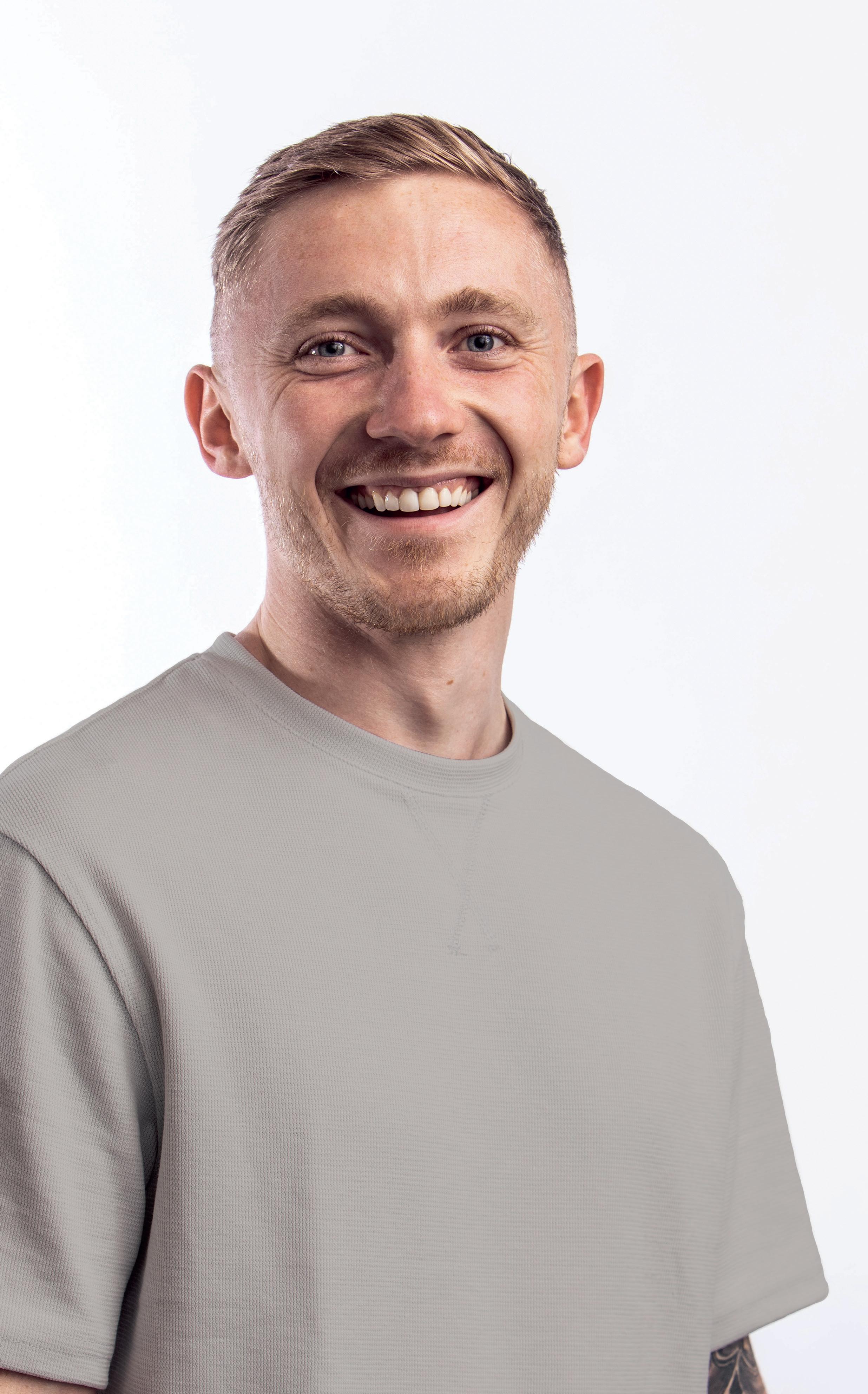





‘If you want to develop real strength and resilience, read this book’ Tom Daley







‘If you want to develop real strength and resilience, read this book’ Tom Daley
How I Learned to Manage My Mental Health and How You Can Too
Vermilion, an imprint of Ebury Publishing 20 Vauxhall Bridge Road London SW1V 2SA
Vermilion is part of the Penguin Random House group of companies whose addresses can be found at global.penguinrandomhouse.com
Copyright © Nile Wilson 2024
Nile Wilson has asserted his right to be identified as the author of this Work in accordance with the Copyright, Designs and Patents Act 1988
First published by Vermilion in 2024
www.penguin.co.uk
A CIP catalogue record for this book is available from the British Library
ISBN 9781785044809
Typeset in 11/18 pt ITC Galliard Std by Jouve (UK), Milton Keynes. Printed and bound in Great Britain by Clays Ltd, Elcograf S.p.A.
The authorised representative in the EEA is Penguin Random House Ireland, Morrison Chambers, 32 Nassau Street, Dublin D02 YH68
Penguin Random House is committed to a sustainable future for our business, our readers and our planet. This book is made from Forest Stewardship Council® certified paper.
Ey up!
For those of you who don’t who I am, I’m Nile Wilson and I used to do roly-polies for a living!
Well, more accurately, I used to be an Olympic gymnast. I’m a lad from Leeds and, as I’m writing, I’m 28 years old. What’s for sure is that my life has never been anything but colourful.
I made Olympic history at 20 years old by winning Team GB’s first ever medal on the horizontal bar (or high bar, as it’s sometimes called).
I have built a huge social-media following, with over 1.5 million subscribers on YouTube, and I was named as one of the top 50 influencers in the UK by the Sunday Times.
I am an owner of multiple businesses.
I have a penthouse apartment in Leeds.
I have an incredible family around me.
So, I guess I’m what a lot of people think is a ‘success’. Well . . . there is more for you to know about me.
I have struggled enormously with my mental health.
I have found myself crying in the middle of the night for no apparent reason while crippled with anxiety.
I have just finished a 12-month driving ban.
I have struggled with my gambling and drinking.
I have behaved in ways that I am not proud of and I’ve hurt people.
I need help all the time.
Yeah . . . so that’s me. A contradiction in so many ways. From the outside, I look bulletproof, but on the inside there has been a different story going on. I have reached some incredible highs and crashed to some of the darkest lows where I have even contemplated suicide.
I think everybody, maybe even including myself, believes Olympians should have all the answers. We are the ones who have reached the peak of performance under the craziest pressure while the world watched us. We have been celebrated, adored and held up as the people everyone else should aspire to be. I know that I saw Olympians as superhumans when I was young, and when I reached that level I expected to feel that strong. But I definitely haven’t always felt like that inside. The truth is that I have had far more questions about myself than answers to give anyone else. At times I have played up to that superhuman persona of an Olympian, while
inside my head I have felt weak and suffocated. Alcohol and gambling helped me temporarily numb those feelings, but in the end they dragged me down even further.
Since I had to retire from elite gymnastics in 2019, it has felt like my life has taken every possible turn it could and, though I didn’t necessarily realise it at the time, I have learned so much about who I am along the way. Some of those lessons were more than a little uncomfortable – I haven’t always liked what I have found out about myself. It’s true that I took many steps forward during this time, but maybe just as many back. Honestly, it has been fucking tough, but I have come through it and I’m incredibly proud about that. I feel like I have so much to share with you within this book.
So, why have I chosen now to write this book?
This was actually a really important question for me to answer in my head before I started writing this. I have always been honest and transparent about my challenges with my mental health, which have been a significant part of my life for the last three or four years. However, I believe there is a huge responsibility when it comes to sharing advice or experience in this area because it affects so many people’s lives enormously. If I was going to step out in this way and share the lessons I’ve learned then I needed to be sure that I was in the right mental space to do so. Thankfully, I know that I am, but I need to explain that further. I know I am ready to write this book but it doesn’t mean that I am in any
way ‘cured’ of mental health issues. Far from it. I still have challenges. I’m not perfect and I am still capable of making mistakes. Just like anyone. That’s the thing about mental health, you don’t just wake up one day and go, ‘I’ve solved it!’ It’s like any area of your health – you need to respect it enough to keep your eye on it all the time. When you neglect it, it comes back around to bite you.
So, I’m not sitting here, writing this, pretending to be someone who has cracked the puzzle as to how to never have poor mental health – it doesn’t work like that. But, and it is a big ‘but’, the last 12 to 18 months have been truly transformational for me. I feel like I have turned a corner and started to understand the things that I have needed to. My mental health has improved dramatically during this time, and when things have happened that could have caused me to mentally fall off a cliff, I didn’t. I have managed to find ways of not reacting unhealthily to stressful situations, which in the past would have set off a series of events creating a downward spiral in which I feel extreme anxiety and a dark depression. Finally, I feel like I am handling my mental health with knowledge and self-awareness, rather than as a person feeling their way through the dark.
It is for this reason that I know I’m ready to write this book and share with you all that I have learned during this time. I want to be a powerful young voice to help people with their mental health challenges. The strongest emotion
I have felt during my darkest times has been loneliness, and I don’t want anyone to feel that – it’s fucking horrible. We can be surrounded by people and yet feel desperately alone in our heads. I know that by speaking out, I can be a serious force in helping with these challenges, and this book is a reflection of that.
In 2022, I won one of ITV’s flagship television shows Dancing on Ice in front of millions of people. It was a massive thing to happen to me for lots of reasons, and I’ll explain why that was in a bit. But it nearly didn’t happen at all. Not many people will know this, but when my agent got me an audition for the show, I was in a pretty bad place. Dancing on Ice was a huge opportunity and yet I almost blew it before I’d even turned up.
In early 2019, I suffered a neck injury while at a British Gymnastics training camp in Germany. I was practising my floor routine and as I did a tumble, I felt a sharp ‘pop’ in my neck. It was big enough for me not to be able to ignore it. Within hours, the pain was as bad as I have ever felt in my life. It was horrific. Ten out of ten pain. I would eventually find out that a disc in my neck was now pushing straight into a nerve. The injury was so bad that I needed surgery. In the end, it finished my career. I had thought I’d be able to return to gymnastics after the surgery, but every time I tried, my body broke down due to the toll the injury had taken on me.
When I realised it was all over, I started to feel completely lost. Not having the opportunity to perform in front of people left a huge void in my life. It had been such a passion for me – I had fallen in love with performing gymnastics aged four, and it truly felt part of who I was as a person. So when the opportunity to audition for Dancing on Ice came up, I knew that it would mean a chance for me to do that again in front of millions of people watching on television. It almost didn’t matter that it was ice skating, a whole different sport – I was desperate for it. And yet at that time in my life, I still couldn’t hold it together even to be on time for the audition.
I had just started serving that 12-month driving ban, my mental health was shot to pieces and I was making poor decisions around alcohol. I knew that my agent had fought for me to get that audition. But instead of being there bright and early, I turned up an hour and a half late for it. I bloody slept through my alarm, didn’t I, and missed my train to Manchester. I had to jump in a cab as soon as I woke up. It was awful and embarrassing – but also a true reflection of where I was then in my life.
By some miracle, they liked me at the audition despite my lateness, and I got one of the last slots on the show. To this day, I look back on that and think how lucky I was. If I hadn’t got on the show, would I have been able to get myself where I am today? Honestly . . . I don’t know. Not only was I given
the opportunity to perform again, but I was also given a structure again around training and preparing for the live shows. That structure was so important, giving me the routine, purpose and direction that I craved after retiring. Now I could be back to being an athlete, even if it was with ice skates on rather than flying around a metal bar. The whole experience all the way to the final proved to be truly incredible.
Yet, there was something that came out of Dancing on Ice that I didn’t expect at all. Yes, I got the experience of being on TV in front of millions of people and the incredible accolade of ultimately winning the final. There’s no question that I got a massive buzz off the fact that people were so excited about my performances that they voted for me to win. At the time, I thought this was the thing I’d been searching for since retiring from gymnastics. But when I came out the other end of it having achieved everything that I wanted, I realised, to my surprise, that I didn’t actually need the validation of performing in front of all these people as much as I thought I did.
Now, don’t get me wrong, I loved the whole experience and will be forever grateful to the show for the opportunity, but this realisation at the end of it was a huge breakthrough for me. I could enjoy striving for something but didn’t desperately need it to define my happiness. Lifting the trophy in the final was magical, but what was far better was seeing my friends and family afterwards and us laughing, dancing and
spending time together. I realised that I didn’t need to keep searching and chasing for something – everything I needed was right there in front of me, and it was within my experience with the people surrounding me in my life. Suddenly I felt like I had more clarity and my eyes were open.
After other big events in my life, mainly gymnastics competitions, if I had performed brilliantly in them, like the Olympics final, then I would feel like I could fly. If it had all gone wrong, like in the European Games in 2015, which I’ll tell you all about shortly, then my whole world would feel like it was falling apart. Yet, this time, I wasn’t necessarily on top of the world or having an enormous crash – I was more level about it all. It was wonderful, with lifetime memories, but, maybe for the first time in my life, my achievement didn’t have an enormous impact on my overall happiness. In the past, my results in gymnastics had a dangerous attachment to whether I would feel happy or not. I realised then that over the previous six months I had unknowingly begun to learn so much about myself and how to manage my mental health.
I hope there are things in this book that will help everyone. But one specific reason why I wanted to write it is that I still think men in particular struggle to talk openly about their mental health, and I completely understand that. Part of masculinity is wanting to be strong, a leader and a
protector – and if you don’t, it can be incredibly lonely and you feel like a failure. What I want to do is give people the courage to be able to just accept where they are at. This doesn’t necessarily mean you have to shout out your pain to the world, but just for you to get to a place where you can speak to somebody and not feel guilty or ashamed about it. When you do that, you can feel less lonely, which gives you strength to face challenges.
If a person is feeling less-than because they don’t feel like they are matching up to their own expectations then I want them to unlock that potential of being honest about it. Rather than see it as a weakness, I would love to help people understand that there is great power in it. Just because we’re experiencing feelings of sadness and hopelessness, it doesn’t mean that we can’t still be a leader, a provider and a strong person. By talking about it, addressing the pain and understanding it, we actually empower ourselves to be stronger people – whatever that looks like for each individual. I know that as a young man, I used to see showing vulnerability as being a weakness; now I see it as a great strength.
What follows from that is knowing more about who you are and then finding ways to be disciplined enough to do the things that you know are going to be good for you. This is actually a really important point – you can know what you need to do but then you need to action it. My self-awareness around this has increased massively. I’ve been talking about
all of this for the last four years, but it is only in the last eighteen months that I’ve been brave enough to implement it and be more consistent with it.
One of the main ways this has manifested in my own life is around drinking. The truth is that I don’t always like who I am when I have been drinking, and drinking tends to happen when I have got myself in a hole with my mental health – so, I don’t want to get in that hole in the first place. I don’t want to be that guy who struggles to have a conversation, stuck in his own head all day, every day and just hides away. I want my brain to be buzzing in a good way; I want to be able to have fun with my friends and family. The alternative is a crap version of Nile that’s in pain and difficult to be around.
Just one of the important things I have learned is that when I get myself into a dark place with my mental health, I subconsciously don’t want to get out of it. As back-tofront as that sounds, I would rather stay in the darkness because that is what I am used to. It’s bad, but it’s also weirdly comfortable. Maybe this is something you can relate to? Are there situations in your life that are not healthy but strangely you feel more at ease with that struggle than trying to find a solution? Internally, I think, ‘I don’t know how I’ve got here, but this is what it is.’ And that’s usually when I look for an escape with something like alcohol. They feed into each other and then all of a sudden, after two, three or four months, I realise, ‘I’m really not good here.’ But you
just see it as being where you operate, and you just try to keep the wheels turning. I now know that I don’t want that. That’s not a good way to live.
My priority in life is not winning medals or trophies anymore; it is consistently doing the things that I know make me healthy and feel good. The lessons I have learned over the last few years have given me tools that have genuinely transformed my life. I am going to share all of these with you because I know how much they can do for your life as well. I feel incredibly excited for the opportunity that lies ahead for you! My lessons might be different to someone else’s and you might find that you want to try to apply something I explain here in a different way. But they are real, they have changed so much for me and they can do the same for you.
I want you to read this book from start to finish because the order is important. Also, please have a notebook to hand so you can note down the things that hit home for you as we go through each topic. I am going to continually ask you to self-reflect, and writing down your thoughts will help you enormously with that.
We are going to look at various aspects of self-awareness so that you can understand yourself better. The relationship we have with ourselves is the most important one we can have, and this is one of the main things I want to help you with. I am also going to give you practical advice that you
can put into action on a daily basis – because managing our mental health is an ongoing, everyday process. Most importantly, I am not going to put you under pressure or place you in a position where you are comparing yourself with others. I am definitely not a ‘box-ticking’ guy who is just going to set you things to do as part of a generalised list. My advice is as much about helping you find what works for you as anything. I even think some of my advice might shock you!
Ultimately, I want you to be the best version of you, whatever that feels like – and it gives me a buzz just to tell you that. The darkness cripples our creativity, our conversations, our curiosity, our laugher and who we are meant to be. We are going to have days when we don’t feel OK, and that’s OK. There is no such thing as perfect and trying to chase it will lead us off down a dead end. That doesn’t mean that we shouldn’t try to achieve wonderful things, but if that involves a search for perfection in some way, whether in a relationship, job or something else, it can suffocate our happiness. This is about being able to ride the ups and downs of life. When we are being the best we can be, everything flows so much more easily. We can reach our goals, however ambitious they are, and most importantly, we are happy and healthy.
As a young lad from Leeds, I genuinely feel privileged and humbled to be able to share this book with you.
Let’s do this!
I want to start this book with a chapter that brings us all together to recognise what that fall into the deep hole of poor mental health feels like. I know that the first time I suffered from anxiety and depression, I thought I was the only person in the world who felt like that. You might be reading this feeling the same? Maybe you feel or have felt that no one understands the struggle you have with your mental health? That loneliness is a significant part of the desperate and dark feelings that we experience. This chapter is aimed at tackling this by putting into words how we feel during these times so that we can recognise that we are not alone with it.
Here are some words that I think of when I contemplate that hole: suffocating, out of control, breathless, crippling, head-fuck, alone, darkness upon darkness, fucking horrible. All of these are exactly why poor mental health can be so
debilitating for someone. But what is often forgotten is that you don’t suddenly feel all these things. Most of us don’t feel fantastic one day and then wake up the next day feeling like our world has caved in. It’s not like going from a hundred to zero in a flash – this thing is damn sneaky. It creeps up on you. And at the very start of a downward spiral you don’t necessarily recognise the path you’re about to go on – it is too subtle for that. That is why you can suddenly look around and find yourself in a challenging place mentally, then wonder how you ever got there. And why it is so hard for people around you to understand.
If I could put that downward spiral into words, it would go something like this.
‘I’m good.’
‘I’m pretty good.’
‘I’m fine.’
‘I’m fine.’
‘I’m fine.’
‘OK, I’m not fine but it’s fine.’
‘It’s fine.’
‘I’m fucked.’
My use of the word ‘fine’ has always been very telling. It’s a nothing word really. A stopgap. I use it when all is not well but I won’t admit it to myself, so ‘fine’ gives me a get-out. It’s also a reflection of how the decline is gradual – ‘fine’ is that middle territory from good to shit that you can live in
for quite a while without thinking much about it. Only when you have started to recover can you track back to where it all began. This slow slide has caught me out a lot, and it is why I now maintain a healthy respect for what can happen and the need for me to see the signs early. If ever I take my eye off my mental health and what keeps me healthy or, even worse, think I’m ‘cured’, I find myself sliding back to that place again without even realising that the process has started.
Sometimes there is an obvious trigger for this spiral, and at other times, there won’t be. This is a really important point to remember. There doesn’t have to be something that’s clearly gone wrong in your life to make you feel like something is very wrong. This can often be a really confusing part of experiencing poor mental health. It feels like there should be a reason for it but there isn’t always an obvious one to be found. However, what I have learned over time is that when I have fallen into a downward spiral, it has been a compounding of decisions, a chain of events and a series of feelings that all seem individually small but add up over time until they feel like a huge monster or a mountain. The best analogy I can give to explain this is a bathtub gradually filling up with water. The bath is never overflowing until it is overflowing. There isn’t an actual problem until that one extra drop of water causes it to overflow. There may have been times to get concerned while the bath water
was approaching the top, but until that last extra drop lands, you might have felt like you didn’t need to do anything. That is exactly the same process I am talking about with mental health. Both you and the people around you might not necessarily see the problem that is coming until that one extra thing pushes you over the edge. To continue this analogy, our bath also overflows when we have forgotten to check on it, when we have taken our eye off it. Mental health is exactly like that. When we don’t pay attention to it or respect it enough, then we can all of a sudden have a problem.
If you’re not sure what a downward spiral might look like – or if you know only too well but feel like you are alone in the dark pit you have slid into – let me tell you about one of my worst. As I mentioned before, I suffered a neck injury in 2019, while away at a Great Britain training camp in Germany. The pain was horrific and the journey home on the plane was terrible. Every bump or movement caused a jolt of pain through my neck. I wanted to be home more than anything. However, even when I got home it was still bad. There was a two-week wait for surgery and it was the most excruciating fortnight of my life. And it wasn’t just about the physical pain. The timing and nature of this injury was really significant for me in my bid to take part in the Tokyo 2020 Olympics – I was now facing a major problem. The physical pain was obvious, but the mental pain was an
intense internal worry about the future and whether I would recover in time for the Olympics, or ever, for that matter. An injury to your neck makes you feel vulnerable in so many ways because it’s such a pivotal part of the human body and the movements we can make. When I had such pain in it, I felt physically vulnerable, even defenceless. All of this added to the mental agony I felt.
I couldn’t handle the pain. I just wanted out from it. So, to escape, I drank a lot of alcohol and took a lot of painkillers during my wait for surgery. At this point, you might be thinking that wasn’t so bad because, well, whatever gets you through and recovery couldn’t start until after surgery anyway. But it doesn’t work like that for me. I had already begun a process of mentally trying to escape the situation. Drugs and alcohol were my way of doing this. This meant that when I came out of surgery, the same anxiousness – general and about the future – was still haunting me. I still couldn’t train so I lacked purpose, was restless and bored. And guess what? I still didn’t want to sit with it, I still didn’t want to deal with it. The understandable but not necessarily helpful dynamic in this sort of situation is that lots of people have sympathy for you so you get away with a lot of things. Being withdrawn or sad, or drinking a lot are things that people might expect during this time, so they don’t necessarily notice that it might be the start of a major problem.